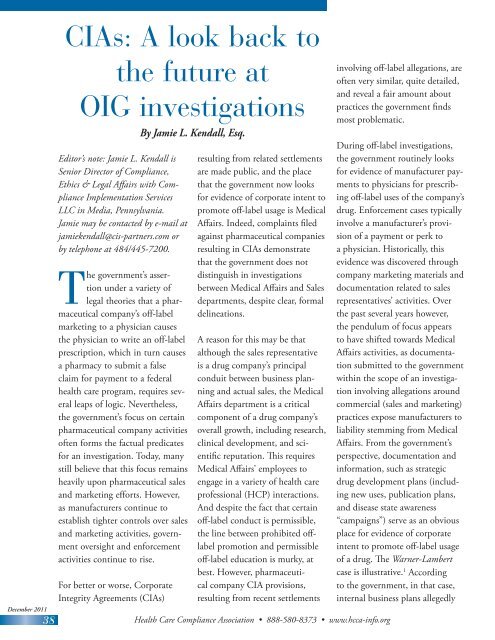Quality of the estimate. December, p. 47 - Health Care Compliance ...
Quality of the estimate. December, p. 47 - Health Care Compliance ...
Quality of the estimate. December, p. 47 - Health Care Compliance ...
You also want an ePaper? Increase the reach of your titles
YUMPU automatically turns print PDFs into web optimized ePapers that Google loves.
<strong>December</strong> 2011<br />
38<br />
CIAs: A look back to<br />
Editor’s note: Jamie L. Kendall is<br />
Senior Director <strong>of</strong> <strong>Compliance</strong>,<br />
Ethics & Legal Affairs with <strong>Compliance</strong><br />
Implementation Services<br />
LLC in Media, Pennsylvania.<br />
Jamie may be contacted by e-mail at<br />
jamiekendall@cis-partners.com or<br />
by telephone at 484/445-7200.<br />
The government’s assertion<br />
under a variety <strong>of</strong><br />
legal <strong>the</strong>ories that a pharmaceutical<br />
company’s <strong>of</strong>f-label<br />
marketing to a physician causes<br />
<strong>the</strong> physician to write an <strong>of</strong>f-label<br />
prescription, which in turn causes<br />
a pharmacy to submit a false<br />
claim for payment to a federal<br />
health care program, requires several<br />
leaps <strong>of</strong> logic. Never<strong>the</strong>less,<br />
<strong>the</strong> government’s focus on certain<br />
pharmaceutical company activities<br />
<strong>of</strong>ten forms <strong>the</strong> factual predicates<br />
for an investigation. Today, many<br />
still believe that this focus remains<br />
heavily upon pharmaceutical sales<br />
and marketing efforts. However,<br />
as manufacturers continue to<br />
establish tighter controls over sales<br />
and marketing activities, government<br />
oversight and enforcement<br />
activities continue to rise.<br />
For better or worse, Corporate<br />
Integrity Agreements (CIAs)<br />
<strong>the</strong> future at<br />
OIG investigations<br />
By Jamie L. Kendall, Esq.<br />
resulting from related settlements<br />
are made public, and <strong>the</strong> place<br />
that <strong>the</strong> government now looks<br />
for evidence <strong>of</strong> corporate intent to<br />
promote <strong>of</strong>f-label usage is Medical<br />
Affairs. Indeed, complaints filed<br />
against pharmaceutical companies<br />
resulting in CIAs demonstrate<br />
that <strong>the</strong> government does not<br />
distinguish in investigations<br />
between Medical Affairs and Sales<br />
departments, despite clear, formal<br />
delineations.<br />
A reason for this may be that<br />
although <strong>the</strong> sales representative<br />
is a drug company’s principal<br />
conduit between business planning<br />
and actual sales, <strong>the</strong> Medical<br />
Affairs department is a critical<br />
component <strong>of</strong> a drug company’s<br />
overall growth, including research,<br />
clinical development, and scientific<br />
reputation. This requires<br />
Medical Affairs’ employees to<br />
engage in a variety <strong>of</strong> health care<br />
pr<strong>of</strong>essional (HCP) interactions.<br />
And despite <strong>the</strong> fact that certain<br />
<strong>of</strong>f-label conduct is permissible,<br />
<strong>the</strong> line between prohibited <strong>of</strong>flabel<br />
promotion and permissible<br />
<strong>of</strong>f-label education is murky, at<br />
best. However, pharmaceutical<br />
company CIA provisions,<br />
resulting from recent settlements<br />
<strong>Health</strong> <strong>Care</strong> <strong>Compliance</strong> Association • 888-580-8373 • www.hcca-info.org<br />
involving <strong>of</strong>f-label allegations, are<br />
<strong>of</strong>ten very similar, quite detailed,<br />
and reveal a fair amount about<br />
practices <strong>the</strong> government finds<br />
most problematic.<br />
During <strong>of</strong>f-label investigations,<br />
<strong>the</strong> government routinely looks<br />
for evidence <strong>of</strong> manufacturer payments<br />
to physicians for prescribing<br />
<strong>of</strong>f-label uses <strong>of</strong> <strong>the</strong> company’s<br />
drug. Enforcement cases typically<br />
involve a manufacturer’s provision<br />
<strong>of</strong> a payment or perk to<br />
a physician. Historically, this<br />
evidence was discovered through<br />
company marketing materials and<br />
documentation related to sales<br />
representatives’ activities. Over<br />
<strong>the</strong> past several years however,<br />
<strong>the</strong> pendulum <strong>of</strong> focus appears<br />
to have shifted towards Medical<br />
Affairs activities, as documentation<br />
submitted to <strong>the</strong> government<br />
within <strong>the</strong> scope <strong>of</strong> an investigation<br />
involving allegations around<br />
commercial (sales and marketing)<br />
practices expose manufacturers to<br />
liability stemming from Medical<br />
Affairs. From <strong>the</strong> government’s<br />
perspective, documentation and<br />
information, such as strategic<br />
drug development plans (including<br />
new uses, publication plans,<br />
and disease state awareness<br />
“campaigns”) serve as an obvious<br />
place for evidence <strong>of</strong> corporate<br />
intent to promote <strong>of</strong>f-label usage<br />
<strong>of</strong> a drug. The Warner-Lambert<br />
case is illustrative. 1 According<br />
to <strong>the</strong> government, in that case,<br />
internal business plans allegedly

















